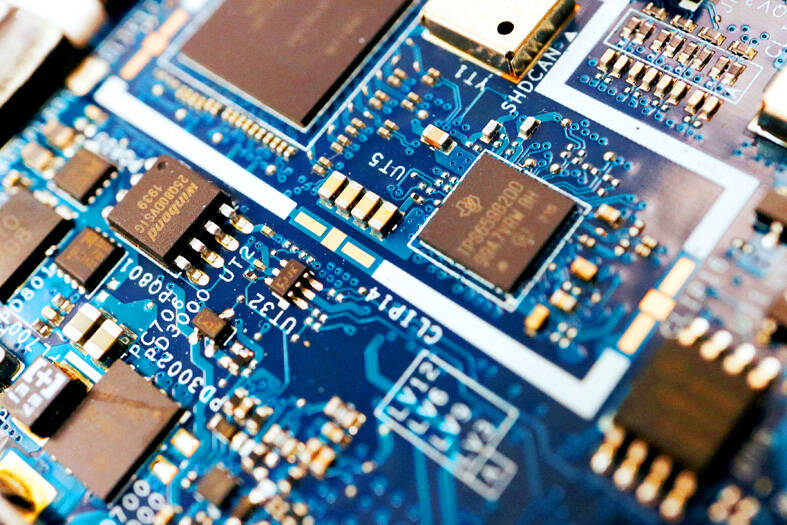Global semiconductor industry revenue is expected to grow 16.8 percent year-on-year next year, following a slump this year, largely fueled by a surge in demand for memory chips, US-based market information advisory firm Gartner Inc said on Monday.
Gartner said the global semiconductor industry is forecast to generate US$624 billion in sales next year, up from US$534 billion this year, during which revenue is predicted to fall 10.9 percent amid inventory adjustments caused by weak demand.
The global market for memory chips is expected to rebound next year by 66.3 percent, following a fall of 38.8 percent this year due to oversupply issues, Gartner said.

Photo: Reuters
The price of NAND flash memory chips, a type of storage technology that does not require power to retain data, is expected to hit rock bottom over the next three to six months and stage a robust recovery next year, with sales likely to rise 49.6 percent to US$53 billion, Gartner said.
The oversupply of DRAM chips would continue throughout this quarter and trigger a pricing rebound, the full effects of which might emerge next year when sales are estimated to soar 88 percent to US$87.4 billion, it said.
“We are nearing the end of 2023 and strong demand for chips to support artificial intelligence (AI) workloads, such as graphics processing units (GPUs), is not going to be enough to save the semiconductor industry from double-digit decline in 2023,” Gartner vice president analyst Alan Priestley said in a statement.
“Reduced demand from smartphones and PC customers coupled with weakness in data center/hyper scaler spending are influencing the decline in revenue this year,” Priestley added.
Gartner said developments in generative AI and large-language models are driving up demand for high-performance GPU-based servers and accelerator cards in data centers, which subsequently creates a need for workload accelerators.

Semiconductor business between Taiwan and the US is a “win-win” model for both sides given the high level of complementarity, the government said yesterday responding to tariff threats from US President Donald Trump. Home to the world’s largest contract chipmaker, Taiwan Semiconductor Manufacturing Co (TSMC, 台積電), Taiwan is a key link in the global technology supply chain for companies such as Apple Inc and Nvidia Corp. Trump said on Monday he plans to impose tariffs on imported chips, pharmaceuticals and steel in an effort to get the producers to make them in the US. “Taiwan and the US semiconductor and other technology industries

SMALL AND EFFICIENT: The Chinese AI app’s initial success has spurred worries in the US that its tech giants’ massive AI spending needs re-evaluation, a market strategist said Chinese artificial intelligence (AI) start-up DeepSeek’s (深度求索) eponymous AI assistant rocketed to the top of Apple Inc’s iPhone download charts, stirring doubts in Silicon Valley about the strength of the US’ technological dominance. The app’s underlying AI model is widely seen as competitive with OpenAI and Meta Platforms Inc’s latest. Its claim that it cost much less to train and develop triggered share moves across Asia’s supply chain. Chinese tech firms linked to DeepSeek, such as Iflytek Co (科大訊飛), surged yesterday, while chipmaking tool makers like Advantest Corp slumped on the potential threat to demand for Nvidia Corp’s AI accelerators. US stock

The US Federal Reserve is expected to announce a pause in rate cuts on Wednesday, as policymakers look to continue tackling inflation under close and vocal scrutiny from US President Donald Trump. The Fed cut its key lending rate by a full percentage point in the final four months of last year and indicated it would move more cautiously going forward amid an uptick in inflation away from its long-term target of 2 percent. “I think they will do nothing, and I think they should do nothing,” Federal Reserve Bank of St Louis former president Jim Bullard said. “I think the

SUBSIDIES: The nominee for commerce secretary indicated the Trump administration wants to put its stamp on the plan, but not unravel it entirely US President Donald Trump’s pick to lead the agency in charge of a US$52 billion semiconductor subsidy program declined to give it unqualified support, raising questions about the disbursement of funds to companies like Intel Corp and Taiwan Semiconductor Manufacturing Co (台積電). “I can’t say that I can honor something I haven’t read,” Howard Lutnick, Trump’s nominee for commerce secretary, said of the binding CHIPS and Science Act awards in a confirmation hearing on Wednesday. “To the extent monies have been disbursed, I would commit to rigorously enforcing documents that have been signed by those companies to make sure we get